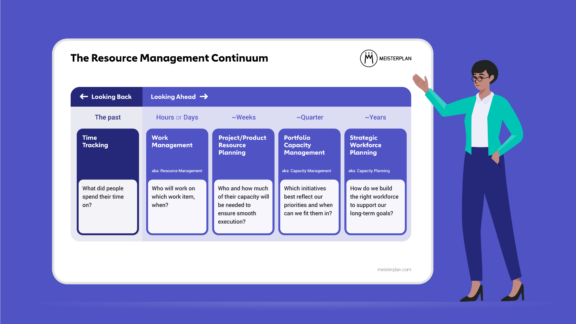What is Resource Management?
When it comes to resource management, the focus is on the optimal planning, coordination and monitoring of resources. The term “resources” includes things like employees, budgets, materials and time.
Resource Management:
Definition | Examples | Synonyms
Resource management is a key element of project portfolio management. It involves the careful planning and coordination of resources.
In the world of project portfolio management (PPM), resource management refers in particular to the management of resources in the form of employees. Since employees are all unique people, so are their ideas, talents, skillsets and capacities. In resource management, the goal is to assign these resources to projects where their ideas and skills are most needed, and to align the supply and demand of employee capacities for various planning periods.
A Practical Example
Let’s say you’ve been tasked by a client to develop an app for an online store. You’d like, as usual, to develop the app as quickly as possible without sacrificing quality. Additionally, you have yet other projects that you don’t want to compromise on.
Who on your team has the relevant skills and expertise, as well as the capacity, to handle this pressing project? Your employees, Tom and Jerry, have a lot of experience in this area, but are currently dealing with another project.
Jennifer, however, has available capacity and the necessary expertise to take that project over from Tom and Jerry. What’s more, Karla can be trained to support Jennifer in case of any bottlenecks.
You ensure that the workload is evenly distributed and that no one is overburdened or underutilized. You also set up regular meetings to encourage open communication and acquire the tools necessary to facilitate productive collaboration on this high-priority project.
The projects could be completed without anyone going over capacity. Customers and clients are happy, and you can open your online store. Sounds good, doesn’t it?

Synonyms
You will occasionally see the term “resource planning” used as a synonym for resource management. That said, this isn’t always the case. At Meisterplan, we use the term “resource planning” to refer to a specific part of the resource management process.
Also worth noting is the abbreviation “RM“, which can stand for either “resource management” as a process or the role of “resource manager”.
FAQ
Here you can find answers to your most pressing questions about resource management.
“Resources“ are more than the material things that go into making a product. People, with the labor, skills and ideas that they bring, are also resources.
In fact, these resources require even more careful management than physical resources. While material resources can be stored for later and used as needed, underutilized work time can never be recovered.
Resource management is worthwhile for all companies that want to ensure that their prioritized projects are completed on time without overloading their employees.
Within these companies, department and team leads are often responsible for managing the utilization of their resources. However, in many organizations, project managers can also be responsible for resource management. For example, it may be the case that a team lead is in charge of both a project and the resources assigned to it.
Typically, resource managers are responsible for:
- having a good overview of employees and their assignments on ongoing projects.
- knowing which employees have which skills.
- keeping the utilization level of an employee in mind.
- reallocating tasks and projects in the event of a cancellation or bottleneck, as well as setting new priorities if necessary.
- identifying bottlenecks.
- initiating recruiting and hiring efforts.
- staying in close contact with project managers, team members and upper management
Resource management can be thought of as four different, but similar, activities: portfolio capacity management, strategic workforce planning, project resource planning and task management.
Strategic Workforce Planning
Focused on the long-term, strategic workforce planning involves recruiting measures to maintain or improve capacity supply over a long timeframe in accordance with planned projects. Typically, it is highly data-driven and seeks to reduce bottleneck constraints by accurately forecasting future resource demands.
Portfolio Capacity Management
Taking more of a short- or medium-term view, portfolio capacity management seeks to align project priorities and scheduling with available capacity. The goal is to ensure that the necessary staff are available at the designated times.
Project Resource Planning
As the start of a new project approaches, resource managers need to identify employees with the appropriate skills and sufficient capacity, assign them to the project and make adjustments to ongoing projects where necessary.
Task Management
Task management has more to do with project management than project portfolio management. Here, individual tasks in a project are assigned to employees and scheduled in great detail. Planning occurs only within an individual team and at a very granular level, as opposed to at a departmental or organizational level.
Effective resource management offers numerous benefits. It enables you to successfully complete your most important projects on time without overburdening your employees or sacrificing quality, leading to increased customer satisfaction.
Resource management also provides you with an overview of your capacities, helping you to communicate them transparently and plan more proactively. This helps to avoid bottlenecks before they appear and easily resolve them should they arise. As a result, your employees have enough time to perform at their best and are more likely to stay with the company for the long haul.
Good resource management can help you answer questions from a variety of temporal perspectives, like:
- Short-term → How do we deal with a sudden bottleneck?
- Medium-term → Who is available for an upcoming project?
- Long-term → Where do we usually have problems, and what kind of employees do we need for our future projects?
Resource management is suitable for all companies that value organized processes, the well-being of their employees and customer satisfaction. It is beneficial for those who want to ensure that their prioritized projects are completed on time and with the highest possible quality without overburdening their employees.
Resource management and resource planning are often used interchangeably; however, resource planning is actually a subset of resource management. It refers to the ideal allocation of resources during the planning phase. In the initial stage, employees are assigned to prioritized projects. After that, resource managers take a more granular look to determine how much capacity the resource can contribute to that project. This process of finding optimal allocation is referred to as resource planning.
Resource Management with Meisterplan
Meisterplan helps you allocate your most important resource, your employees, optimally.
With Meisterplan, you can see at a glance…
- who is currently working on what project.
- who has which skills.
- who has capacity when.
- who is at or over capacity.
- how changing your plan or setting new priorities affects whole teams and individual employees.
Piqued your interest?
Read more about resource management in our comprehensive blog post on the topic, learn more about the resource management continuum, or get into the details of what capacity planning and management really involve.
Discover More Here!
Dive even deeper into resource management! Each article offers valuable insights and expert knowledge that we would like to share with you.

Are People Resources? – Why Do We Call Employees Resources?

What Exactly Is Resource Planning? The Basics for Novices and for Pros.
